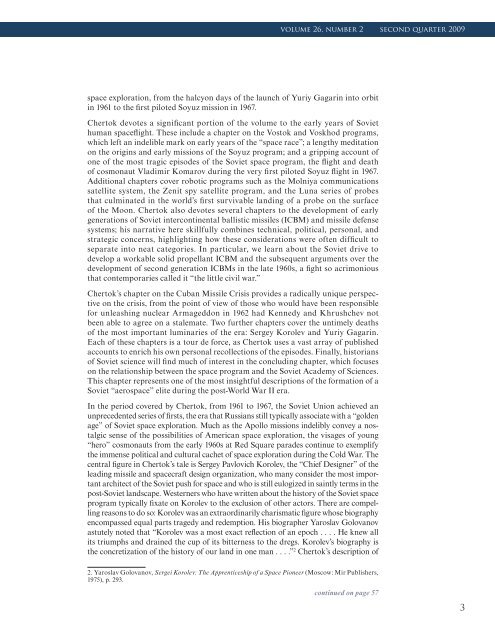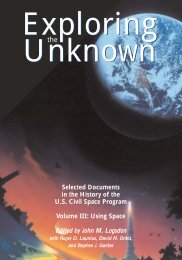FROM THE CHIEF HISTORIAN BORIS CHERTOK'S Rockets and ...
FROM THE CHIEF HISTORIAN BORIS CHERTOK'S Rockets and ...
FROM THE CHIEF HISTORIAN BORIS CHERTOK'S Rockets and ...
Create successful ePaper yourself
Turn your PDF publications into a flip-book with our unique Google optimized e-Paper software.
volume 26, number 2 second quarter 2009<br />
space exploration, from the halcyon days of the launch of Yuriy Gagarin into orbit<br />
in 1961 to the frst piloted Soyuz mission in 1967.<br />
Chertok devotes a signifcant portion of the volume to the early years of Soviet<br />
human spacefight. These include a chapter on the Vostok <strong>and</strong> Voskhod programs,<br />
which left an indelible mark on early years of the “space race”; a lengthy meditation<br />
on the origins <strong>and</strong> early missions of the Soyuz program; <strong>and</strong> a gripping account of<br />
one of the most tragic episodes of the Soviet space program, the fight <strong>and</strong> death<br />
of cosmonaut Vladimir Komarov during the very frst piloted Soyuz fight in 1967.<br />
Additional chapters cover robotic programs such as the Molniya communications<br />
satellite system, the Zenit spy satellite program, <strong>and</strong> the Luna series of probes<br />
that culminated in the world’s frst survivable l<strong>and</strong>ing of a probe on the surface<br />
of the Moon. Chertok also devotes several chapters to the development of early<br />
generations of Soviet intercontinental ballistic missiles (ICBM) <strong>and</strong> missile defense<br />
systems; his narrative here skillfully combines technical, political, personal, <strong>and</strong><br />
strategic concerns, highlighting how these considerations were often diffcult to<br />
separate into neat categories. In particular, we learn about the Soviet drive to<br />
develop a workable solid propellant ICBM <strong>and</strong> the subsequent arguments over the<br />
development of second generation ICBMs in the late 1960s, a fght so acrimonious<br />
that contemporaries called it “the little civil war.”<br />
Chertok’s chapter on the Cuban Missile Crisis provides a radically unique perspective<br />
on the crisis, from the point of view of those who would have been responsible<br />
for unleashing nuclear Armageddon in 1962 had Kennedy <strong>and</strong> Khrushchev not<br />
been able to agree on a stalemate. Two further chapters cover the untimely deaths<br />
of the most important luminaries of the era: Sergey Korolev <strong>and</strong> Yuriy Gagarin.<br />
Each of these chapters is a tour de force, as Chertok uses a vast array of published<br />
accounts to enrich his own personal recollections of the episodes. Finally, historians<br />
of Soviet science will fnd much of interest in the concluding chapter, which focuses<br />
on the relationship between the space program <strong>and</strong> the Soviet Academy of Sciences.<br />
This chapter represents one of the most insightful descriptions of the formation of a<br />
Soviet “aerospace” elite during the post-World War II era.<br />
In the period covered by Chertok, from 1961 to 1967, the Soviet Union achieved an<br />
unprecedented series of frsts, the era that Russians still typically associate with a “golden<br />
age” of Soviet space exploration. Much as the Apollo missions indelibly convey a nostalgic<br />
sense of the possibilities of American space exploration, the visages of young<br />
“hero” cosmonauts from the early 1960s at Red Square parades continue to exemplify<br />
the immense political <strong>and</strong> cultural cachet of space exploration during the Cold War. The<br />
central fgure in Chertok’s tale is Sergey Pavlovich Korolev, the “Chief Designer” of the<br />
leading missile <strong>and</strong> spacecraft design organization, who many consider the most important<br />
architect of the Soviet push for space <strong>and</strong> who is still eulogized in saintly terms in the<br />
post-Soviet l<strong>and</strong>scape. Westerners who have written about the history of the Soviet space<br />
program typically fxate on Korolev to the exclusion of other actors. There are compelling<br />
reasons to do so: Korolev was an extraordinarily charismatic fgure whose biography<br />
encompassed equal parts tragedy <strong>and</strong> redemption. His biographer Yaroslav Golovanov<br />
astutely noted that “Korolev was a most exact refection of an epoch . . . . He knew all<br />
its triumphs <strong>and</strong> drained the cup of its bitterness to the dregs. Korolev’s biography is<br />
the concretization of the history of our l<strong>and</strong> in one man . . . .” 2 Chertok’s description of<br />
2. Yaroslav Golovanov, Sergei Korolev: The Apprenticeship of a Space Pioneer (Moscow: Mir Publishers,<br />
1975), p. 293.<br />
continued on page 57<br />
3
















